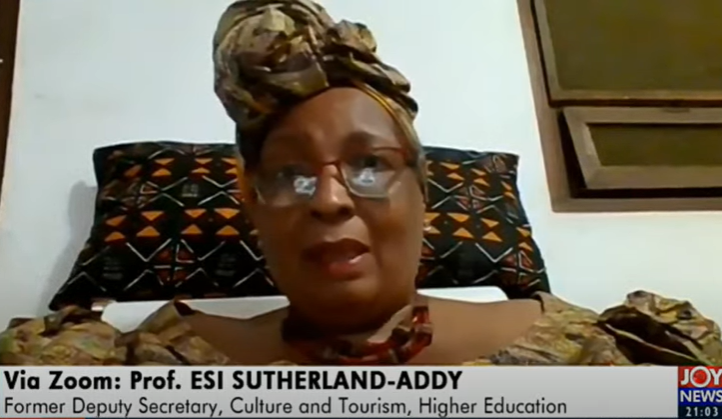A former Deputy Secretary for Culture and Tourism in the Rawlings administration has disclosed that her reason for staying with the 1979 revolution was because she believed in the ideals of the revolution.
According to Prof Esi Sutherland Addy, the revolution stood for "probity, accountability and social justice."
"I realised the ideals of the revolution were ideals I could live with," she said.
Her comment comes as part of discussions on the legacy of former President Rawlings, in honour of his demise.
The Professor, in an interview on JoyNews' 'The Probe,' disclosed that the former President, was a man who gathered a formidable team of people with great expertise to work for him.
The Revolution of 1979
The 1979 revolution was sparked by then leader of the Armed Forces Revolutionary Council, Jerry John Rawlings, over allegations of corruption by the ruling government under the leadership of General F.K Akuffo.
Then flight Lieutenant put Jerry John Rawlings on public trial for attempting to overthrow the government on May 15th 1979.
This happened because Rawlings was a junior soldier in the Ghanaian Army who with other soldiers were refused to be given their salaries.
Rawlings turned the trial against the government by accusing it of massive corruption and requesting that his fellow accused be set free as he was solely responsible for the mutiny.
He was incarcerated for sentencing. His diatribe resonated with the entire nation as there was massive suffering.
In the night of June 3rd 1979, junior military officers including Major Boakye Djan broke into the jail where Rawlings was being held and freed him, and ostensibly marched him to the national radio station to make an announcement.
The first time the public heard from Rawlings was a now legendary statement that he Rawlings had been released by the junior officers and that he was under their command.
He requested all soldiers to meet with them at the Nicholson Stadium in Burma Camp in Accra.
The entire nation went up in uproar. The soldiers rounded up senior military officers including three former heads of states, General F. K Akuffo, Ignatious Kutu Acheampong and Afrifa for trial. They were subsequently executed by firing squad.
Years on, a deputy Secretary for Culture and Tourism, under the Rawlings administration has disclosed that, the revolution was not borne out of ill motive. Rather, it stood for probity, social justice and accountability.
Prof Addy who also worked as a Deputy General Secretary for Education disclosed that she felt comfortable working under the Rawlings administration.
She explained that it was because, she worked alongside people who, though believed in these ideals of the revolution, also had expertise and dedication to the various sectors that she happened to work on.
"A lot of my friends and colleagues were actually part of the intellectual and ideological backbone of the revolution," she told host Emefa Apawu.
"So it was a really formidable team of people with the technical know-hows," she said.
Latest Stories
-
Ukraine warns of WW3 ahead of stalled US aid vote
18 mins -
Paris 2024: LeBron James, Steph Curry and Kevin Durant named on USA basketball team
57 mins -
Woman rejected after a job interview because she wasn’t wearing makeup
1 hour -
4 little habits that cause big problems in your marriage
1 hour -
Election 2024: NPP establishes PWDs secretariat; targets 1.6 million PWDs votes
1 hour -
PIAC touts GNPC’s prowess as key energy provider
1 hour -
Fidelity Bank joins United Nations Global Compact initiative
1 hour -
Let’s leverage digital age to empower female CEOs, entrepreneurs – Bawumia
1 hour -
MTN and Huawei launch Joint Technology Innovation Lab to drive Africa’s digital transformation
1 hour -
‘I have no regrets’ – Pep Guardiola on Man City’s Champions League exit
2 hours -
Ghana, Vietnam commit to promoting bilateral relations
2 hours -
Police officer dies in pursuit of traffic offender
2 hours -
NDC’s attempt to pooh-pooh our efforts to increase Ghana’s power grid senseless – Atta Akyea
2 hours -
Paris 2024: Cadman Yamoah eyes Olympics spot
2 hours -
Bayern Munich end Arsenal’s Champions League dream as Kimmich scores winner
3 hours

